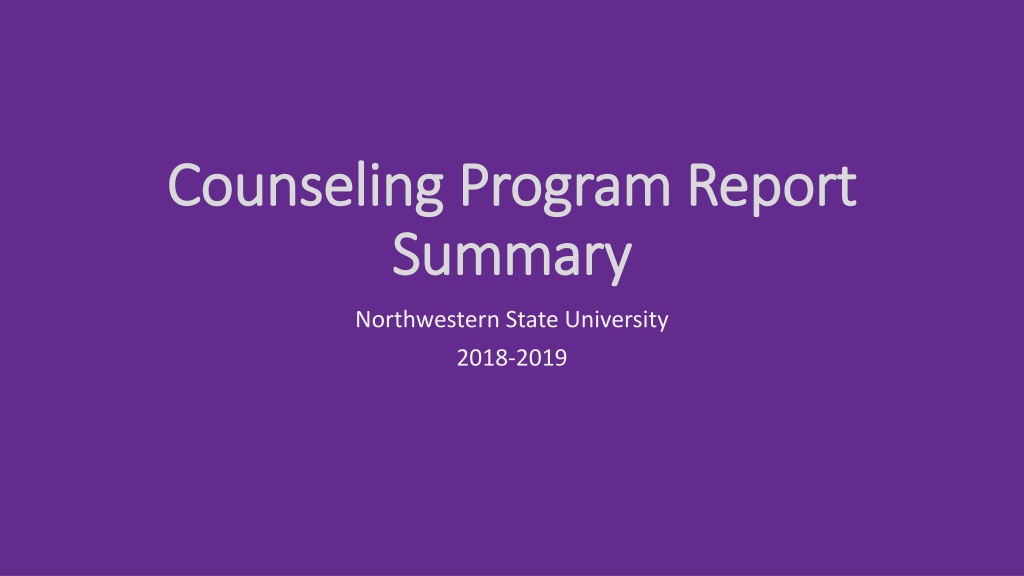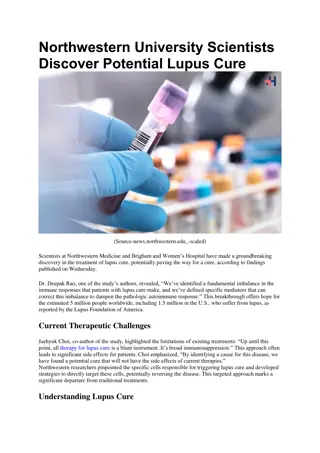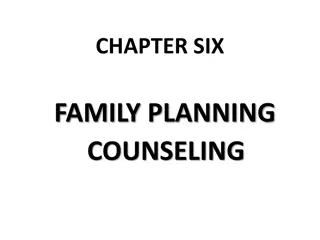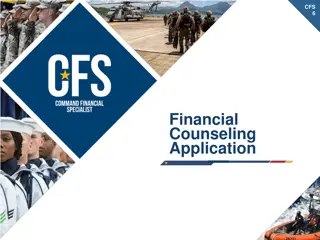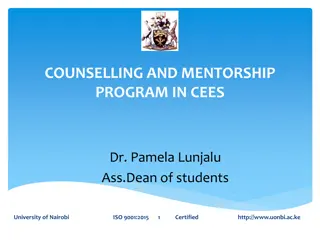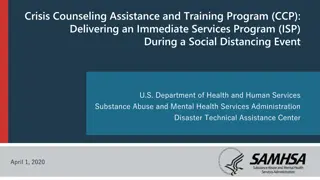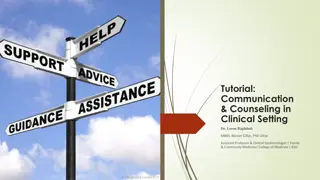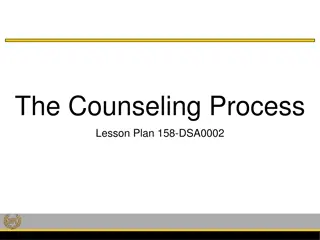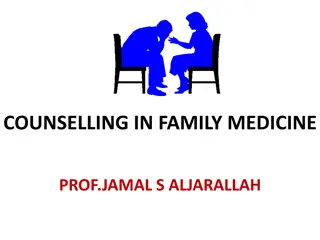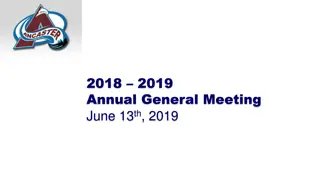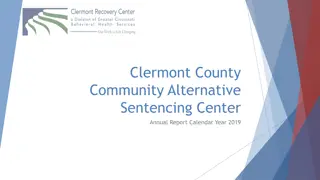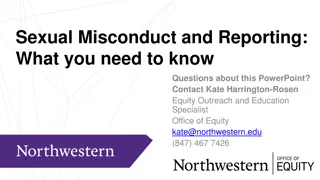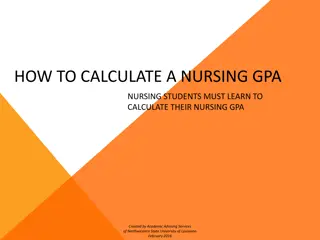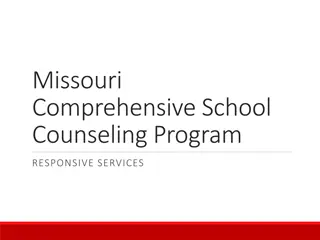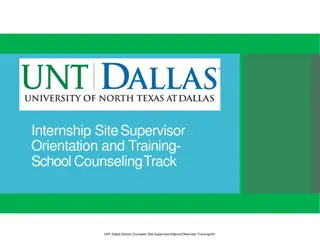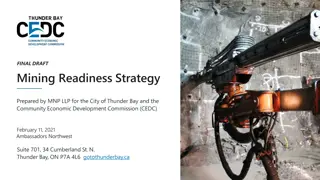Counseling Program Report Summary at Northwestern State University (2018-2019)
Northwestern State University conducted an assessment of their Counseling Program objectives for the year 2018-2019. The program's performance in various content areas was evaluated, including Professional Functioning, Human Growth/Development, Career Development, and more. Strengths were identified, such as strong clinical portfolios and focus areas in counseling processes and group counseling. Looking forward, improvements will be made based on student feedback, with courses being redesigned and updated for better student learning outcomes.
Download Presentation

Please find below an Image/Link to download the presentation.
The content on the website is provided AS IS for your information and personal use only. It may not be sold, licensed, or shared on other websites without obtaining consent from the author. Download presentation by click this link. If you encounter any issues during the download, it is possible that the publisher has removed the file from their server.
E N D
Presentation Transcript
Counseling Program Report Counseling Program Report Summary Summary Northwestern State University 2018-2019
Northwestern State University Assessment of Counseling Program Objectives (2018-2019) Objective Content Area NSU Comprehensive Exam Percentage NCE National Statistical Summary (2016) 85% #1 Professional Functioning/Helping Relationships Multicultural/Cultural Contexts 70% 75% #2 76% 67% #3 Human Growth/Development 71% 77% #4 Career Development/Life Factors 63% 78% #5 Counseling Process/Professional Orientation 73% 71% #6 Group Counseling 63% 67% #7 Assessment 68% 68% #8 Research/Program Evaluation 60% Student Overall Ratings - Excellent At least two professional development opportunities were offered each semester. #9 Field Experiences #10 Professional Development
CMHC Concentration Percentages for each standard were either at Target (90% or higher) or Acceptable (80-89%) Strengths: Strong clinical portfolios (Practicum and Internship I/II) Counseling Process Group Counseling Areas for Focus: Human Growth and Development Analysis (Assessment and Testing)
School Counseling Concentration Percentages for each standard were either at Target (90% or higher) or Acceptable (80-89%) Strengths: Intro School Counseling Group Counseling Counseling Process Strong clinical portfolios (Practicum and Internship I/II) 100% Pass Rate for PRAXIS Areas for Focus: Human Growth and Development Analysis (Assessment and Testing)
Looking Forward Based on student feedback, surveys, and assessments, the faculty will be implementing the following actions for Fall, 2019 to improve student learning: (1) In anticipation of moving to CACREP s 2016 Standards, EPSY 5460 was redesigned and updated in Fall, 2018. Updates for Fall, 2019 will be implemented with weekly self-assessments, which allow students to monitor their grasp of concepts. Major course assignments will be revisited and potentially reworked to incorporate best-practice ideas and 2016 CACREP Standards. (2) EPSY 5520 is a course that is consistently labeled as challenging by the program s candidates. Changes will be made to the delivery of the course. This will include incorporating additional WebEx seminars, in which students can directly interact with the instructor in a live, synchronous, online platform, into the online course.
Looking Forward (cont.) While scores indicate students can apply and adhere to legal and ethical standards, counseling faculty recognize the landscape for mental health issues is diverse and ever-changing. Faculty have committed to introducing additional professional development regarding current ethical issues for program improvement. Through graduate surveys the faculty have identified an additional area of focus for the upcoming year: helping students thoroughly ground technique in their theory of choice. This will be done through incorporating specific activities into field experience courses that enhance student learning and prompt students to reflect on the integration of theory and practice (i.e., techniques).
Areas of Strength from 2018-2019 The faculty implemented the following actions for Fall 2018 and Spring 2019 in order to improve student learning: (1) In anticipation of moving to CACREP s 2016 Standards, EPSY 5460 was redesigned and updated. This included weekly self-assessments which allowed students to monitor their grasp of concepts. Major course assignments were revisited and reworked in order to incorporate best-practice ideas and 2016 CACREP Standards. (2) EPSY 5520 was a course that has been consistently labeled as challenging by the program s candidates. Changes were made to the delivery of the course. This included incorporating WebEx seminars, in which students directly interacted with the instructor in a live, synchronous, online platform, into the online course Consistency in Field Experience Coursework Counseling/Helping Relationships Faculty incorporated activities to help students thoroughly ground technique in their theory of choice. This was done through incorporating specific activities into field experience courses that enhanced student learning and prompted students to reflect on the integration of theory and practice (i.e., techniques). The following professional developments were offered in the 2018-2019 academic year: (1) Suicide prevention and ethical obligations, (2) ethics and counselor boundary issues, and (3) ethical considerations in dealing with physically aggressive clients. The complete report can be accessed at: https://www.nsula.edu/documentprovider/docs/436/COEHD%20Counseling%20MA%20(533)%20%20AY%202018- 2019%20Assessment%20(18%20of%2032).pdf
